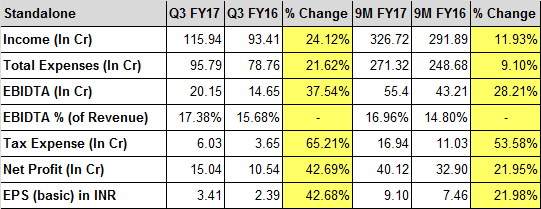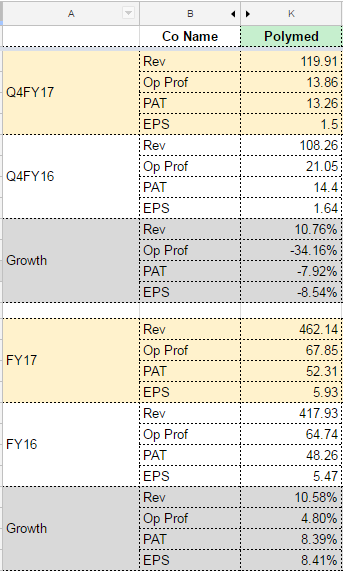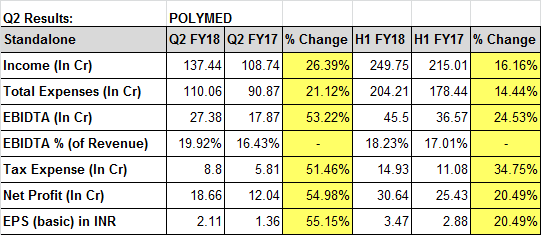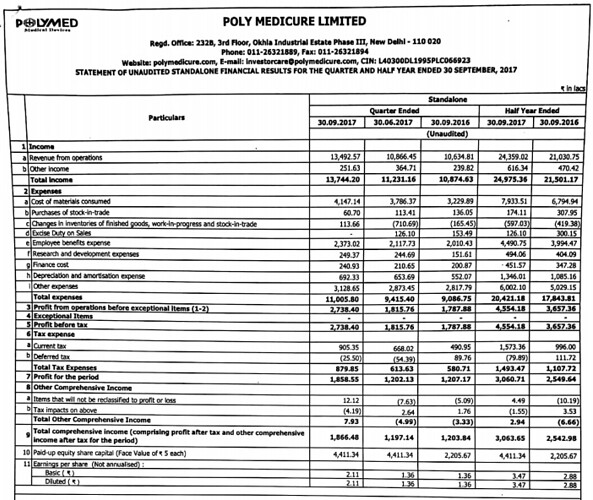On February 2, 2017, government notified the new Medical Devices Rules 2017 with an aim to reduce dependence on imported medical technology and give a boost to domestic manufacturing. The new rule and increase in private & public investment in healthcare are expected to provide big opportunities for Indian medical devices players, according to Himanshu Baid, managing director, Poly Medicure Ltd.
Poly Medicure Limited, one of the leading manufacturers of disposable medical devices, manufactures over 100 varieties of devices through its six global manufacturing facilities – four in India and one each in China & Egypt. Infusion therapy is the company’s key product vertical, which contributed to approximately 67 percent of its net
revenue from operations in fiscal 2016. With an aim to further increase its market share and meet the growing demand of medical devices, the company is constructing a greenfield manufacturing facility at Faridabad (Haryana).
In this interview with Rakesh Rao, Himanshu Baid delves into the nuances of medical technology industry and growth plans for the company.
What was the rationale behind setting up greenfield project in Haryana? Are there any plans of product portfolio expansion?
With this Rs 60 crore greenfield project at IMT Faridabad in Haryana, we will significantly broaden our existing manufacturing facilities to tap on new market opportunities. This will enhance our journey to capitalise on the growth opportunities in the medical devices sector and also to expand our product offerings by introducing a slew of products. The project is geared up to commission in third quarter of 2017 with all statutory approvals. Two manufacturing plants, located in Haryana, are in closed vanity of the new project.
Poly Medicure will introduce new products in gastrology, oncology, nephrology and respiratory care. The company is also adding more diethylhexyl-phlthalate (DEHP) & polyvinyl chloride (PVC) free range of products in the portfolio which will provide better patient and healthcare professional safety. With the new R&D center in Faridabad, commissioned in November 2016, we have doubled our current infrastructure for tooling & design. This will help us in creation of new generation of medical devices.
Are there any plans of acquisitions?
Yes, we are looking for suitable acquisitions overseas and in India which will complement our current business.
What is your view on budget 2017-18?
Industry welcomes Medical Devices Rule 2017, notified on February 2, 2017, which will come effect from January 1, 2018. It will attract investment in sector, will reduce cost of the devices. New rules for pricing medical devices should benefit common man. New FDI policy, under consideration, will hopefully boost the investments in healthcare sector.
How do you view the current status of medical technology sector in India?
At present, the global medical technology market is around $ 350 billion, which is expected to grow 5 percent annually for next 5-7 years. The Indian market is among the top twenty in the world by market size, and fourth in Asia after Japan, China & South Korea.
The medical technology sector in India valued at approximately $ 10 billion in 2015 at end consumer prices and is growing at 10-12 percent annually. Currently, the Indian medical devices industry represents just over 2 percent of the global medical device market.
The Indian medical devices industry has huge potential to grow and be among the top 5 medical devices manufacturing hubs globally. It can also significantly contribute to GDP of the country that will result in fulfilling the government’s vision of healthy India.
The current medical device industry is driven by innovation and new technologies. The advent of engineering innovations have led to the recent development of low cost products that are at par with existing products on quality.
Availability of advanced and sophisticated medical technology is creating new markets & applications, increasing the dependence by doctors on advanced medical devices. This is leading to rapid obsolescence of existing medical technology thereby creating demand for replacement & upgradation of products.
What are the key challenges before medical technology sector in India?
Medical technology fraternity remains concerned over some perturbed policy announcements like too many governing bodies with diverse requirements & standards, inclusion of stents in NLEM, and inclusion of medical devices under UPCMP (as medical devices are completely different from pharmaceuticals).
In addition, Ministry of Environment and Forests has put a cap on useful life for refurbished equipment and import of reused equipment. This ministry has also made announcements on phasing out of chlorinated plastic bags, gloves and blood bags within two years. As of now there are no proven alternative to these products.
Some of these issues seriously affect Ease of Doing Business and the investment environment in the industry.
Recently, government brought stents under price control regime. As a player in the medical devices sector, how do you view this development?
This move will restrict flow of new technology in India and will also slow down innovation. Through appropriate mechanism the government should rewards new technology & innovations and reduce gap between ex-factory/import price to end price to the customer.
Medical devices sector is largely import-dependent. How can we change this scenario?
Medical technology, a nascent industry in India, is described by its fragmented nature, large dependence on imports and a complex and inadequate healthcare delivery system in the country. This industry consists of small and medium companies primarily focusing their R&D efforts and manufacturing capabilities for affordable medical devices such as disposables, medical supplies and small equipment - which come under low-price, high-volume market segments. Requirement of high-end medical equipment and consumables are met largely by imports.
The Government of India has identified the medical devices industry as a sunshine sector for the Make in India initiative. Financial incentives like tax holidays should be extended to new manufacturing plants.
Correction in inverted duty structure and tariff reduction on raw materials and inputs will boost domestic manufacturing. Government should work with domestic and global stakeholders to identify positive iincentives and policy measures that will attract investment and innovations. With a wholesome improvement in India’s business
environment, the healthcare services can be made available at lower costs which will hugely benefit people across classes.
The business environment in India needs to be more investors friendly to bring in an adequate amount of investments and solicit robust growth in the manufacturing industry. For the ease of doing business, our regulatory policies needs to be in line with global regulatory practices so that there should be no hold back for medical device companies to
invest and operate in the country.





